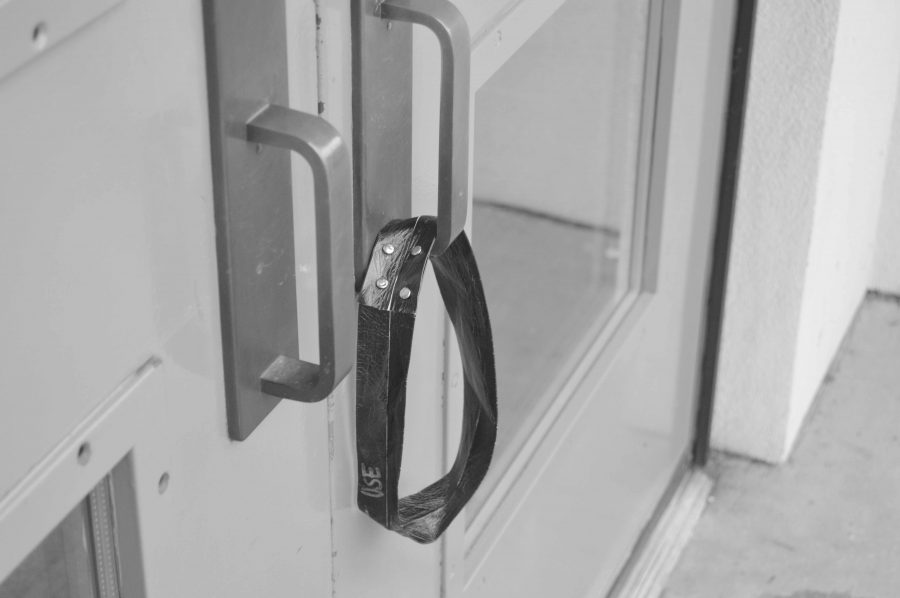Stiffness, excessive sweating, constant fatigue, rapid breathing, panic attacks, anxiety, crying, racing thoughts, headaches or back pain– a handful of symptoms that you might have experienced.
Stress. It is that thing you feel when you have an important game, have to give a speech or are about to take an important test.
“Stress is a natural component [of life]. There is good stress and bad stress and you know, even if you try, biologically and genetically, you are always going to have stress; it is just part of our makeup,” Willie Walker, AP US History, Psychology and Senior Social Studies teacher said.
Anxiety is caused by stressors in people’s life, or anything that causes wear and tear on the body, whether physically, mentally or environmentally.
“Anything emotional causes it. But it kind of differs from person to person a little bit, depending on who you are. It can be some traumatic thing in your life… big tests, like AP tests… having too much going on at one time, a death in the family or abuse. All kinds of issues can cause stress. Sometimes relationships have a big part in it, too,” former PHS health and PE teacher Sue Krippaehne said. “Stress can come up if a family has financial problems coming on, loses a home to a fire or they lose their job, so there is a lot more. It is just when your body gets overwhelmed and your emotions start going out of control and then that takes a toll on your physical body.”
According to Krippaehne, the trick to calming stress is finding what stress management technique works best for you. It is important to relax and manage stress because the fight or flight response does not last forever and stress can lead to headaches, sleep trouble, an upset stomach and a weakened immune system.
Senior Kelty Pierce undergoes a lot of stress, due to a variety of activities that she is involved in. Finding ways to stay organized is crucial to keeping track of everything, she says.
“I make to-do lists. Checking things off a list is one of my favorite things to do… And so if I am stressed, then I kind of take a moment and think ‘ok what needs to get done first?’ So prioritizing is helpful, then making that list and then just going through and saying, ‘ok I know that I cannot check this off,’” Pierce said. “And because I like checking things off, sometimes even if I start on some of the smaller things that I need to get done, maybe that is a load of laundry or going to get gas or finishing up one question from biology… then I feel more motivated to do some of the bigger things and so that helps me. If I feel like I am being productive then that helps me calm down a little bit and not be so stressed.”
This year Pierce is in four AP classes and involved in leadership and ASB. She is also the Daffodil Princess, President of Viking Knights and Ladies and a nanny. Pierce goes to a lot of baseball, softball and soccer games, as well.
“I use my planner religiously. I actually have two planners. I have one just for school work and one for everything else. And then, I also try to budget my time. So I know that this essay is due on Thursday but I have a Statistics assignment due tomorrow, then I will do the Stats assignment first and kind of do stuff like that…” Pierce said. “Also, I am not a procrastinator but I believe that if it was not for the last minute, nothing would get done. Because I feel like when I am under a little more stress and pressure, is when I have more success because I have to get it done so I cannot, especially in English, I cannot go back and change things 100 times, I just have to do it and then go back and edit at the end.”
Senior Grace Bley says she has also felt the effects of stress this year. She found that picking a college, taking AP tests (she took three) and completing Senior Boards were all stressors in her life. To relieve stress, whether it is track practice or going to the gym, she says her go-to is exercise.
“It gets me more energized to get more done. It is good to take a break from studying and go outside or to the gym. It is not possible to study for six hours straight. You need a break,” Bley said.
Walker and Krippaehne agree that an abundance of exercise is great at relieving stress. Exercise releases endorphins, or natural painkillers that relieve pent-up tension. Krippaehne taught in her health class that exercise also enhances the immune system and lowers cortisol levels, a hormone released when people are stressed.
“Well, I love to exercise. Exercise, getting outside, doing something that I enjoy, getting together with my friends, laughing, those are probably my favorite ones [stress relievers],” Krippaehne said.
Although these all work well for Krippaehne, it is okay if they do not work for you.
“I always told my students, ‘everyone is so different,’ you know. What might work for one person, might not work for another. Like for me to say, ‘oh just go out and exercise that relieves stress’ to a person that absolutely hates exercise, that would probably be more stress inducing for them. So, I would always say to my students, here are a whole number of things you can do. Now you have to find the one that kind of fits you,” Krippaehne said.
In addition to exercise, Bley has found that time management is important. It allows people to figure out how they can use their time, prioritize, tackle big projects and reduce stress. Ways to manage time include making lists, keeping a planner, breaking down each day, writing out the month and setting goals.
“I always think time management is important. Keep on top of things, do not procrastinate or let things get out of control, out of hand or too overwhelming. And then when you feel yourself getting stressed, take some time to relax, let your mind rest and talk things out… Find a way so you have some down time, have some fun time, exercise and have good friends to talk to,” Krippaehne said.
Another tip comes from senior Austin Stump, who took five AP classes and tests and taught himself information to take the AP Calculus BC test. He also plays on the Puyallup Varsity baseball team.
“[I suggest] just getting one thing done. Just getting one thing started because once you get one thing checked off, the second thing does not seem so bad… And homework is first. Baseball takes a backseat to that. I just stay on top of it, because when you get behind, that is when it gets really hard, so I use my planner a lot,” Stump said.
Sleep is another aspect of keeping anxiety levels low. Getting enough sleep and a consistent amount each night will help manage stress. Symptoms of stress can include the inability to sleep or excessive sleeping, according to Krippaehne’s health class.
“I am a firm believer in napping. I know that today I probably will not get a nap in, so I am already looking forward to my nap tomorrow. I sometimes have to remind myself that you are only in high school once and you are only 17 or 18-years-old once. So even though I should be staying home and finishing assignments or doing other things, go have fun, watch a game or hang out with friends.” Pierce said. “So I think that maintaining a balance in the things that cause stress in your life and then making sure that you go out and do some fun things or things that are just all about you, are important too.”
While Krippaehne was teaching, she taught that relaxation and easing the mind is a great way to relieve stress once it is already present. Coloring, reading a favorite book, doodling and other simple tasks can help distract a person’s mind from the stressors. By using art therapy, students can allow colors and pictures to express emotions and release frustrations.
Krippaehne also explained that aroma therapy, or the utilization of extracted scents from plants to balance and promote mental and physical help is beneficial. To decrease stress, use eucalyptus and mint scents, lavender and vanilla to increase relaxation and orange scents to increase energy.
Students can also experiment with progressive muscle relaxation, acupressure and deep breathing to find what works for them.
“Some kids really love the relaxation, getting relaxed and doing the breathing and all of that. And other people would say, ‘no that made me more stressed, I did not like that.’ I think it is just such an individual thing that it is kind of hard to say, ‘this is something that does not work.’ It is just so different from person to person,” Krippaehne said.
It is important for students to find balance in their life and work to relieve stress so that the symptoms do not get the best of them. Staying on top of school work before things go too south will help to calm stress.
“I think stress affects them [students] deeply, especially when they are testing, they get anxious and nervous and I think that they lose all mental focus. I try to teach them to relax and breathing methods that will help. And for them, especially for AP exams, study, do your work and make yourself more prepared so you are confident,” Walker said.
Techniques provided to help cope
Haley Keizur, Chief
Published June 1, 2016
Story continues below advertisement
0
Donate to The Viking Vanguard
$15
$500
Contributed
Our Goal
Your donation will support Viking Student Media and the content we create. Your contribution will allow us to purchase equipment and cover our annual costs, including website hosting, printing the newspaper and yearbook, and purchasing new equipment.
More to Discover
About the Contributor

Haley Keizur, Editor-in-Chief
Haley Keizur has been a part of the Viking Vanguard for three years. She began as a sophomore journalist student and freelancer, was the social media editor last year and is currently Editor-in-Chief. She specializes in writing and page designing but has dabbled in photos and broadcast. She won a superior rating in features writing at the JEA National Conference in Seattle last year and has had the opportunity to write for the Ed Lab at the Seattle Times. Besides writing, she enjoys running, reading, playing the ukulele, listening to Taylor Swift, volunteering in the community and spending time with friends. Other favorite things include coffee, sunsets and puppies.


